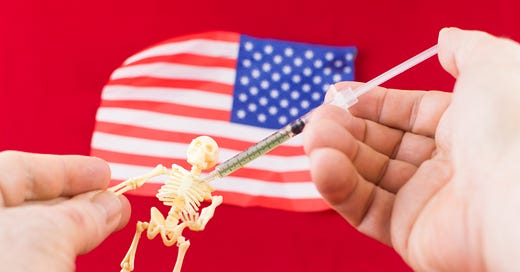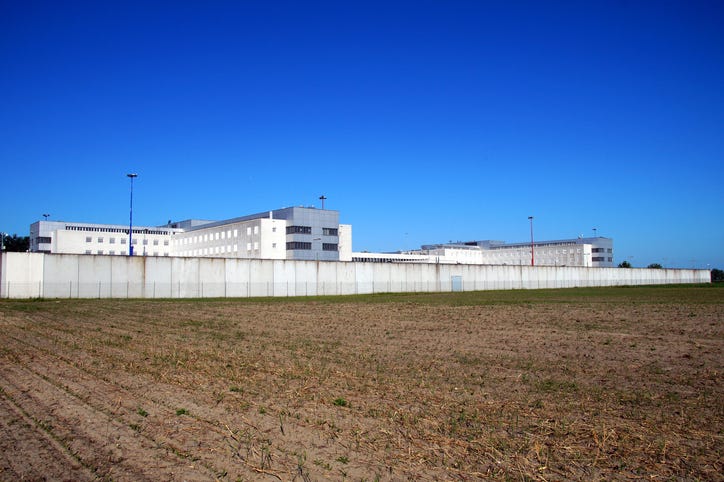Shall we bring back the death penalty?
Murder by the state is never, ever justifiable. The horrendous case of Lucy Letby has opened up this vile conversation yet again
I wrote this article more than a decade ago, following a trip to Florida where I visited a prison that housed male death row prisoners. It was an abomination, and it is still an abomination, to kill prisoners, whatever they have done, and however dangerous they might be.
Florida State Prison, in the small town of Starke, is a sprawling mass of gray concrete and barbed wire, approached by a road lined with palm trees and lush greenery. “This is what I call the green mile,” says my guide Rosalie Bolin, “but at the end of it is hell.” The prison houses death row and the execution chamber.
On the green mile we pass a hearse that, she tells me, is used exclusively by the prison. “No one wants to have their loved ones in a vehicle that has carried murderers,” she says. “People see them as inhumane, and that is how they are treated, even in death.”
Bolin has been involved in preparing mitigation arguments for defendants in capital cases for more than 20 years. There are currently 400 men and four women on death row in Florida and I am visiting Starke to explore America’s shifting opinion on capital punishment.
Capital punishment was suspended in the US from 1972 to 1976. Since the suspension was lifted, 1,280 people have been executed, most since 1990, though only 78 death sentences were passed in 2011, compared to 312 in 1995. Since 1973 more than 130 people have been released from death row after their convictions were overturned. From 2000-11, exonerations have averaged five a year.
A majority of Floridians support the death penalty and opinion, unsurprisingly, is divided along political and religious lines. Three-quarters of Republican voters support state execution compared to just under half of Democrats. Catholics oppose the death penalty more than non-Catholics. Age is also a factor: Americans under the age of 30 are less likely to support the death penalty.
According to Bolin the death penalty perpetuates a view of inmates as monsters beyond redemption or rehabilitation and has no place in a civilised society. “This grotesque system of ours is about stamping out irritants, similar to how you would a spider. It has nothing to do with so-called justice. It is barbaric revenge.”
Such is Bolin’s disgust with the death penalty that she walked out on her lawyer husband and four daughters and in 1996 married one of her clients, Oscar Bolin, a convicted killer and rapist, who had been on death row for five years. Their marriage was broadcast on national TV, her in a lace wedding dress, him on speaker phone behind bars.
She is on record as saying it was meant to be a statement of “great personal sacrifice” that would draw attention to what she thought was a terrible injustice. It was never an infatuation: “People thought the wrong thing.” The marriage never accomplished what she had hoped and has overshadowed her subsequent mitigation work. I have the feeling that Bolin, who spent years trying to prove his innocence, regrets her grand gesture.
Starke, near Jacksonville, has a population of less than 6,000. The vast majority is Southern Baptist, and most adults keep a licensed gun to protect them against intruders at home. At the Starke Rotary Club the members say grace and swear allegiance to the American flag before tucking into baked ham, corn bread and sweet iced tea. Mike, like the majority of Starke residents, has worked in the Floridian prison system. He was an engineer who helped maintain the electric chair, known in Florida as “old Sparky”. He tells me how he had tears in his eyes the first time he saw a death row prisoner prepare for execution. “But then the guard took me to one side and told me he had raped a little girl in front of her mamma and then filleted her like a fish,” says Mike. “From that day on I felt nothing for them.”
Now that prisoners in Florida can choose between lethal injection and electrocution, the electric chair has not been used since 1999. Anonymous men in black robes and hoods are paid $150 to administer the injection after careful selection and training.
Enforcing the death penalty costs Florida $51 million a year, which is more than it would cost to punish all first-degree murderers with life in prison without parole. The reason is that death row inmates in the US usually spend more than a decade awaiting execution: some serve 20 years or more. Oscar Bolin is a case in point. Three previous convictions and two death sentences for the murder of Natalie Holley did not survive appeals. He was recently found guilty in a fourth trial of her second-degree murder and remains on death row for the murders of two other young women.
When I raise the question of time spent on death row with one law enforcement officer he was clear on the solution. “We need swift justice. These endless appeals are no good. If your dog pees on the carpet and you punish him two days later, does he know what he is being punished for? No. We have to go back to early times when justice was carried out swiftly.” A 2009 poll commissioned by the Death Penalty Information Centre found that police chiefs considered the death penalty the least efficient use of taxpayers’ money.
While they wait, conditions for death row prisoners in Forida State are grim. They are isolated from other inmates and excluded from any educational and rehabilitation programmes. They are allowed barely any exercise or visits and often spend 23 hours a day alone in their cells. Inmates are given three meals a day at a total cost of $4.50 each.
“My husband has serious health problems because he gets no fresh food or sunlight,” says Janice, who I met outside the prison one morning before visiting time. Her husband has been inside for several years awaiting execution for a drugs-related murder. “Whatever they have done, they should not be treated like animals.”
Gordon Smith is the affable Sheriff of Bradford County, home of the Florida State Prison. A Democrat, Smith appears genuinely concerned to represent the death penalty as a just and fair response to the most heinous crime. Admitting that it is “unfortunately not a deterrent”, Smith nonetheless believes that there are some violent criminals for whom execution is the only acceptable form of punishment.
“It is a protection of our community,” says Smith. “Some people are so evil that death is the only punishment to fit the crime.” What about imposing a whole life tariff for dangerous killers? “There is always a risk that they may return, and death is final.”
I ask the Sheriff about the apparent contradiction between his religious beliefs and supporting state executions. “Thou shall not kill is really, thou shall not murder,” he replies.
Does the death penalty give better protection against the most dangerous criminals? There is evidence that death sentences are haphazardly meted out, with virtually no connection to the heinousness of the crime. One study in Connecticut, conducted by John Donohue, a Stanford law professor, found that inmates on death row are indistinguishable from equally violent offenders who escape that penalty and that that the process is often arbitrary and discriminatory.
I ask Gordon Smith if he worries about wrongful convictions. “Sometimes people are wrongly convicted, but we are going overboard in trying to protect innocent people and we have cared less and less about the victims of crime.”
During my visit to Florida I repeatedly heard talk of the case of Trayvon Martin, a 17-year-old African American shot dead by George Zimmerman, a neighbourhood activist, in a gated community in Orlando last February. Zimmerman was not charged for more than a month because he invoked self-defence under Florida's so-called “stand your ground” law. This racially charged case has raised the question of discrimination once again. Studies have found that although blacks and whites are murder victims in nearly equal numbers, 80 per cent of prisoners executed were convicted of murders where the victim was white.
Angela Corey is the State Attorney of the Fourth Judicial Circuit of Florida. A veteran prosecutor, during her 25-year tenure Corey has tried hundreds of cases including more than 50 homicides. Once little known outside Jacksonville, Corey is now familiar to millions. She is the prosecutor who charged Zimmerman with second-degree murder. He is now on bail awaiting trial. Corey, an active Republican and devout Christian, is a steadfast supporter of the death penalty.
“I had a young black woman tell me she was totally against the death penalty unless somebody killed someone in her family. Luckily justice is blind and we treat everyone’s loved ones the same.”
Alice Vachss is a prosecutor who, as former chief of the Special Victims Bureau in Queens, NYPD, has helped convict scores of rapists, child abusers and murderers. She is against the death penalty. “Prosecuting stomach-turning crimes, I can certainly name people whose death improves the species. No one can read of the rapes and murders at 10 Rillington Place, for example, and doubt that John Christie deserved to die,” says Vachss. “But the death penalty means that the state buries its mistakes. Has England forgotten that Timothy Evans was hanged for Christie’s crimes?”
The death penalty is an example of calculated, cold-blooded, premeditated murder. As a feminist who has spent my entire adult life campaigning to eradicate violent crimes towards women and children I have seen the devastating effects of child abuse, rape and sexually motivated murder, and yet I do not want to kill those men who carry out such hideous crimes, for to do that would be too liberal a solution. I refuse to believe that any man or woman is born inherently good or evil, and believe that long-term change and individual rehabilitation is possible.
I took seriously the views of those warm and hospitable people I met in Starke, and can understand why, for many, the only just penalty for committing an act of cold-blooded murder is to forfeit the right to life. But it does not deter crime, is expensive to implement, and contravenes every human rights convention. The death penalty degrades America and calls into question its role as leader of the democratic free world.







Wholly with you on this, Julie. Two wrongs don’t make a right. Do you know the passage in the Idiot where Dostoevsky explains why the death penalty is more cruel than other killings? His view was shaped by having faced a firing squad
Hi Julie Thanks for your article as always. I have a question though:
What do you think about serial killers like Clifford Olson in Canada who murdered 11 children between the ages of 11 and 18 and was in prison from 1982 until he died in 2011. It costs approximately $115, 000 per day for each prisoner, which of course is paid by the tax payer. There is an extreme shortage of money for rape relief centres and, if we actually started to offer exiting programs in Canada for prostituted people, some of that money could be used for that. What do you think about if there is absolutely no doubt (re: the serial killer killed at least 2 people) and they show no remorse, as with the case of Olson? Then of course there is also Robert Pickton, Investigators ultimately found the remains or DNA of 33 woman at Pickton's pig farm. He was convicted of murdering six women, and charged in the deaths of 20 more ... all of these women were impoverished, drug addicted, prostituted women from Vancouver's Downtown Eastside.